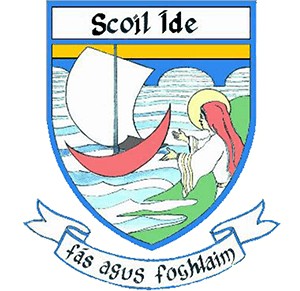Pastoral Care
The quality of pastoral care influences the ethos and tone of the whole school. It creates an atmosphere in which the children feel secure, know that they are valued and are encouraged in their learning, growth and social and spiritual development. The Board of Management, Principal and all staff, teaching and non-teaching, have a responsibility for pastoral care.
As a Catholic school we seek to proclaim the Good News in words and actions, treat each person in a respectful manner and live with each other in the love of Christ. This Pastoral Care Policy provides a framework in which students, staff and parents are aware of their expectations, responsibilities, consequences and the support structures in place to ensure that all members of the school community are treated with equality, respect and fairness. We believe that pastoral care and discipline are interrelated. Discipline is leading, guiding, encouraging and instructing children within a framework of rights, rules, responsibility, routine and consequences. We acknowledge the importance of parents in providing a safe, secure and supporting environment for our students.
Pastoral Care Framework:
- a) Pupils:
- The Class Teacher takes the major responsibility for the pastoral care of children. The focus of the class teacher is on the whole child and their balanced growth and development. Each staff member meets the Principal formally once per year to share information on children’s progress. Informal meetings take place throughout the year.
- The Special Education Team, including the Special Needs Assistants, are involved in ensuring that children who have behavioural or learning difficulties are enabled through group or individual intervention to develop to their full potential.
- The Principal and Deputy Principal are kept informed of potential difficulties and act with the Pastoral Care Team to either prevent or remediate difficulties.
- The Pastoral Care Team is made up of the Principal, Deputy Principal, Special Education Team Leaders, School Chaplain, and the NEPS School Psychologist. The Pastoral Care Team meets once per term, or more often if required, to review the provision of additional assistance to pupils and to prioritise this care. Staff have collectively undertaken CPD in the area of Trauma Informed Practice in an effort to be more aware of and better able to respond to the emotional needs of the children in our school. The Board of Management, conscious of its role as defined by the Scoil Ide Mission Statement, allocates financial resources to the provision of creative therapy to children who are identified as children who would benefit from additional help. These therapies are provided on a one to one or small group basis by certified therapists. In addition, the Principal refers children experiencing other difficulties to the relevant external agencies.
- Student Leadership: Student Leadership is encouraged through the work of the Students’ Council, Class Captains assisting with the care of younger children and Play Leaders.
- Awards: Children are encouraged to strive for excellence in all school activities and the fulfilment of potential. This is encouraged through the thematic approach adopted at assemblies for the senior classes of 4th, 5th and 6th. Children are also recognised for their efforts through Our Merit Moment Initiative, end of year awards and the provision of a vibrant extra-curricular and co-curricular programme.
- Child Protection: The Board of Management has approved and adopted theChild Protection Procedures ( revised 2023) for the school. Any issues in this area are reported to the Principal, who as Designated Liaison Person will take appropriate action.
- Pupil Health: Specific pupil health concerns are brought to the staff’s attention. Appropriate staff in-service training will be carried out to provide information and support to enable staff to deal with individual pupils.
- b) Staff Care:
- Induction and Mentoring: Each new teacher has an Induction day prior to commencing teaching to familiarise them with the school, its Mission Statement, Ethos and the School Policies and Procedures. The Mentor Organiser has a programme in place, which supports teachers in their first and second year of teaching. Standard meetings are a further support to beginning as well as experienced staff. Newly appointed Special Needs Assistants are allocated a mentor from the experienced staff to ease them into their role.
- Professional and Staff Development: The staff is provided with ongoing professional development. School based professional development is part of regular in-school and out of school staff meetings.
- Staff Support: The Principal and School Chaplain are always available to staff. The Social Committee organise regular social outings for staff.
- The DES Employee Assistance scheme operated through Spectrum Life is a confidential counselling service available to Teachers and their families 24 hours a day. They can be contacted at Freephone: 1800411057
WhatsApp: Text ‘Hi’ to 087 369 0010 SMS: Text ‘Hi’ to 087 369 0010
- Anti-harassment Policy: As a Catholic school community we uphold the intrinsic dignity of all people and promote behaviour reflective of that dignity. Harassment is any form of behaviour that is not wanted and not asked for which offends, humiliates or intimidates a person. For behaviour to constitute harassment it must be unwanted and uninvited.
- c) Parents:
- The School will support parents by communicating to them about their child’s progress and development. We will also assist parents by informing them of how best they can help their child academically.
- If parents are experiencing family problems the school can offer support through assisting the children come to terms with those difficulties.
- If necessary the school will ask the NEPS psychologist to speak to parents who seek assistance.
- Parental Education on a variety of topics will be organised by the school and the Parents’ Association.
- The School Chaplain provides advice or a listening ear to parents. The Chaplain is always available.
